Heart Check-Up Singapore
Last updated: Jan 16, 2026
In Singapore, nearly one in three deaths in 2022 was associated with cardiovascular disease. This emphasizes the importance of regular heart check-ups. This article discusses the different types of cardiac health screenings and risk assessments available in Singapore, with a focus on early detection and prevention of heart disease.
The Importance of Heart Health Screening
Detecting cardiovascular disease early can be life-saving, helping to prevent the progression of
potentially serious heart conditions. Regular screening is important not only for those considered
at risk but for everyone, as heart disease often develops silently without noticeable symptoms in
its early stages.
Embracing regular check-ups is an essential strategy in the fight against cardiovascular diseases,
providing a critical opportunity for early intervention and prevention.
Key
risk factors contributing to the rising
prevalence of heart diseases in Singapore include:
- Unhealthy Lifestyle Choices: Diets rich in saturated fats, sodium, and processed foods, combined with sedentary habits, significantly impact heart health.
- Hypertension: High blood pressure increases the risk of heart disease and is becoming more common.
- Diabetes: A condition that significantly raises the risk of various cardiovascular problems.
- Obesity: Excess body weight is closely linked to heart disease.
- Aging Population: The risk of heart diseases increases with age, and Singapore's aging population is particularly vulnerable.
- Smoking: Despite a decline in smoking rates, it remains a significant risk factor for heart disease.
- Genetic Predispositions: Family history and genetic factors can increase the likelihood of heart conditions.
- Environmental Factors: Stress and air pollution also contribute to the risk of developing heart diseases.
Through early detection, lifestyle modifications, and medical interventions, we can address the rising prevalence of heart diseases, leading to healthier lives and communities.
Convenient, discreet, and reliable. Book your home screening today.
Types of Heart Check-Ups Available in Singapore
Electrocardiogram (ECG)
An Electrocardiogram (ECG) is a simple, non-invasive procedure used during heart examinations to record the electrical signals of the heart. By placing small electrodes on the skin, this test can identify certain heart issues, such as irregular heart rhythms (arrhythmias). However, it is important to understand that an ECG may not reveal all heart problems, like blocked arteries, unless they are causing abnormal heartbeats at the time of the test. The process is quick and requires no special preparation, making it a convenient option. Often, it is combined with other tests to provide a more complete assessment of heart health.
Treadmill Stress Test
A Treadmill Stress Test evaluates heart health by monitoring the heart's activity during physical exertion. It involves walking on a treadmill, where the intensity gradually increases, while ECG (electrocardiogram) readings are taken. This test helps identify if there's reduced blood flow to the heart, indicating potential heart conditions.
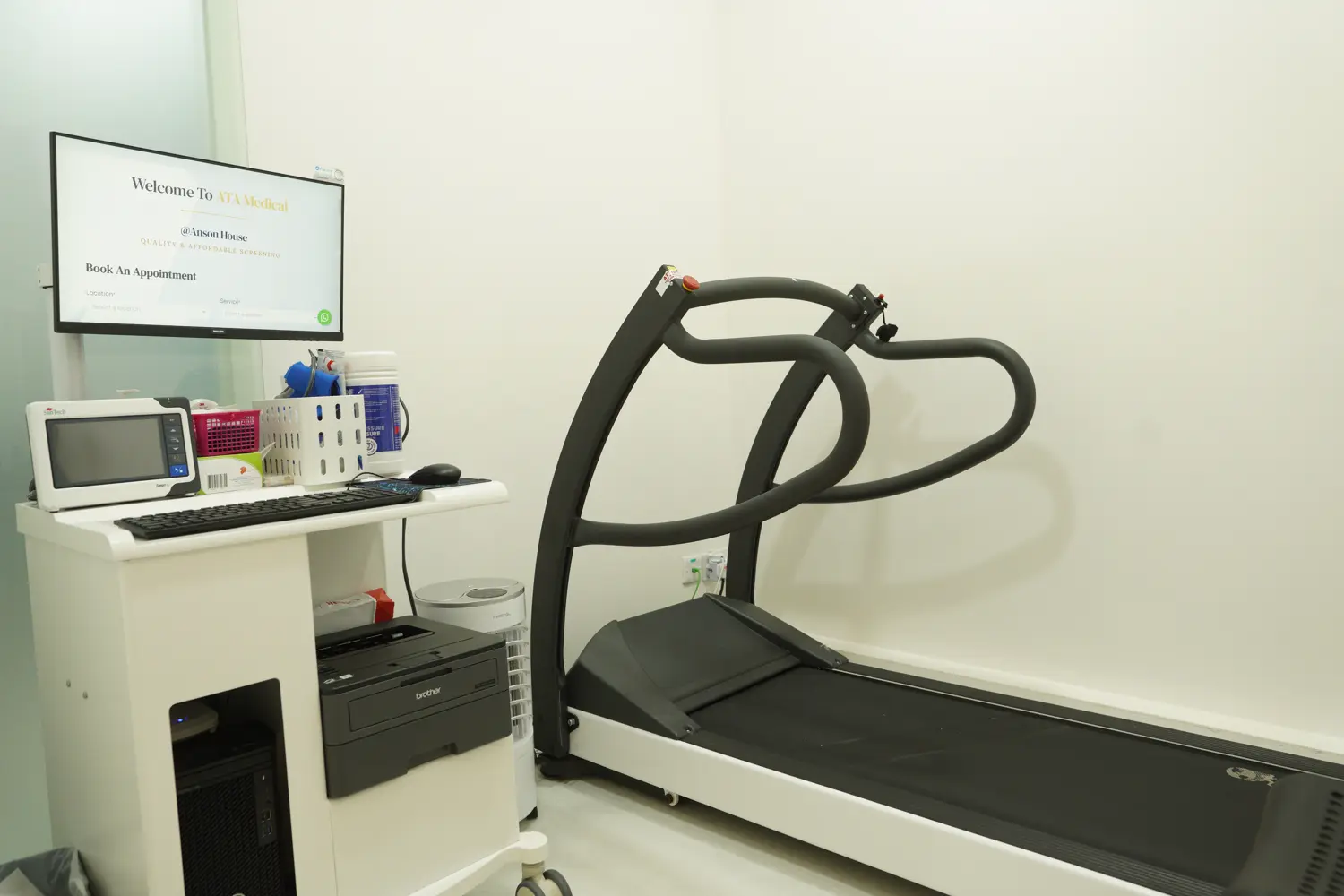
Who Should Consider a Treadmill Stress Test?
This test is particularly recommended for individuals who have symptoms of coronary artery disease, such as chest pain or shortness of breath during exercise, or for those with a family history of heart disease. It's also useful for assessing the effectiveness of treatments in people diagnosed with heart conditions.
Comprehensive Blood Tests

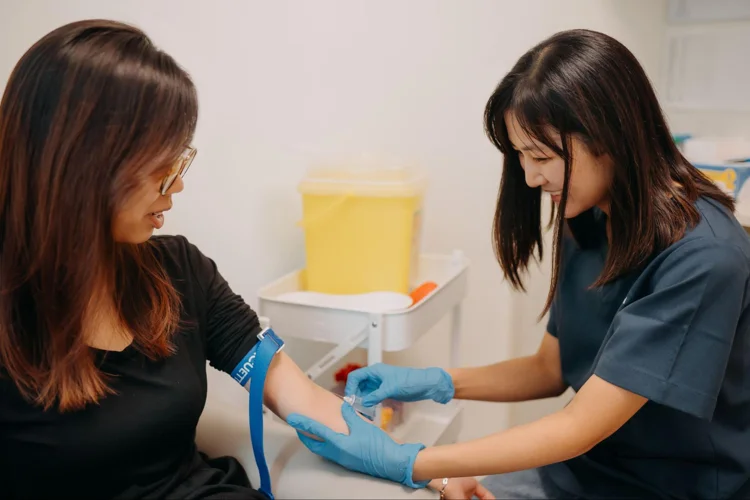
Blood tests for heart health can include various markers, including:
- Lipid profiles (cholesterol levels),
- C-reactive protein (which indicates inflammation),
- and blood glucose levels.
These tests provide critical information on factors that may increase the risk of heart disease.
Ultrasound Carotid Intima-Media Thickness (CIMT)
Carotid intima-media thickness (CIMT) ultrasound is a non-invasive imaging technique used to assess the thickness of the inner layers of the carotid artery walls. It's primarily used to evaluate the presence and progression of atherosclerosis, which is the buildup of plaque in the arteries. CIMT can help identify individuals at higher risk for cardiovascular diseases, such as heart attacks and strokes.
CT Calcium Score Scan
Understanding CT Calcium Score Scans
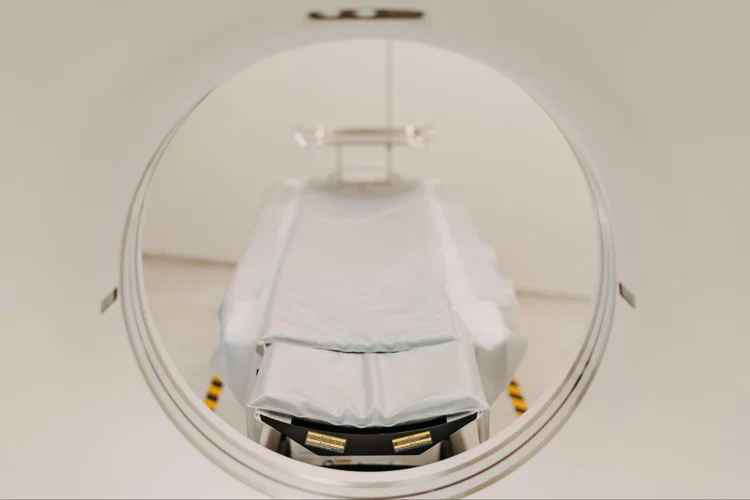
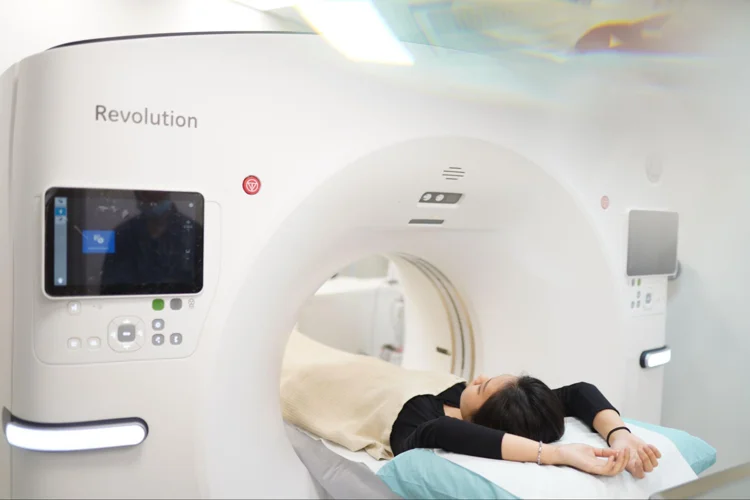
A CT Calcium Score Scan is a non-invasive test that uses computed
tomography (CT) to measure the amount of calcified plaque in the coronary
arteries. The presence of calcium is an early sign of coronary artery disease, and the
amount of calcium scored helps in assessing the risk of heart attack.
The results from a CT Calcium Score Scan can help predict the risk of coronary artery disease and
guide individuals and their healthcare providers in taking preventive measures. This could include
lifestyle changes or medication to lower the risk of heart disease.
CT Coronary Angiography (CTCA)
CT Coronary Angiography
(CTCA) is a non-invasive imaging test that provides detailed images of the heart's blood
vessels. It's highly effective in diagnosing coronary artery disease and assessing the severity of
any blockages.
Unlike traditional angiography, which involves inserting a catheter into the blood vessels, CTCA is
non-invasive and involves much less risk and discomfort. It also provides highly detailed images
that can help in the accurate diagnosis and treatment planning for heart disease.
Heart Check Up Costs in Singapore
If you are experiencing medical symptoms such as lethargy, chest pain, or unexplained weight loss, we strongly recommend consulting with our doctors prior to proceeding with these tests. Please be aware that these tests may not provide comprehensive insight into the underlying cause of your symptoms, and the interpretation of results should be contextualised to the individual by our doctors.
Consultation and review of the test results with our doctor will be chargeable at $38.15 (teleconsultation) to $49.05 (clinic consultation) NETT.
| Test | Price* |
|---|---|
| Consultation | $49.05 |
| Apolipoprotein B | $32.70 |
| HsCRP | $38.15 |
| Lipoprotein (a) | $59.95 |
| Fasting Insulin | $66.49 |
| Homocysteine | $74.12 |
|
Essential Lipid Profile: Full Cholesterol Test (Total, LDL, HDL, Triglycerides, HDL Ratio) |
$21.80 |
|
Cardiac Screening 3: Essential Lipid Profile + Apolipoprotein B (ApoB) + HsCRP |
$63.22 |
|
Cardiac Screening 4: Cardiac Screening 3 + Homocysteine + Fasting Insulin + Glucose Note: Fasting is required for accurate results of Fasting Insulin and Glucose. |
$172.22 |
| Stroke Screen (includes MRA, COW & Carotids) | $1,231.70 |
| ECG | From $49.05 |
| CT Coronary Angiogram | From $1,384.30 |
| CT Calcium Score | From $403.30 |
| Ultrasound Carotid Intima-Media Thickness (CIMT) Test | From $163.50 |
| Health Screening Packages with Blood Tests | From $76 |
|
[Optional] Premium Mobile Blood Drawing at Your Home
Designed for busy professionals, VIP guests, or those who prefer privacy and
convenience.
|
$54.50 (per location up to 5 pax) |
^Prices last updated on Jan 28, 2026. While every effort is made to keep pricing information up to date, please contact our team to confirm the latest rates.
Where Can I Do the Heart Check Up in Singapore?
ATA Medical is conveniently located at two different locations:
- Tanjong Pagar Medical Clinic (Closest MRT: Tanjong Pagar EW15)
- Orchard Clinic (Closest MRT: Orchard Boulevard TE13)
Longevity Health Screening Packages
- Detect early risks of age-related conditions with advanced health tests tailored for long-term wellness.
- Gain peace of mind with a comprehensive review by experienced doctors who focus on preventive care.
- Take proactive steps today to maintain vitality, health, and quality of life for years to come.

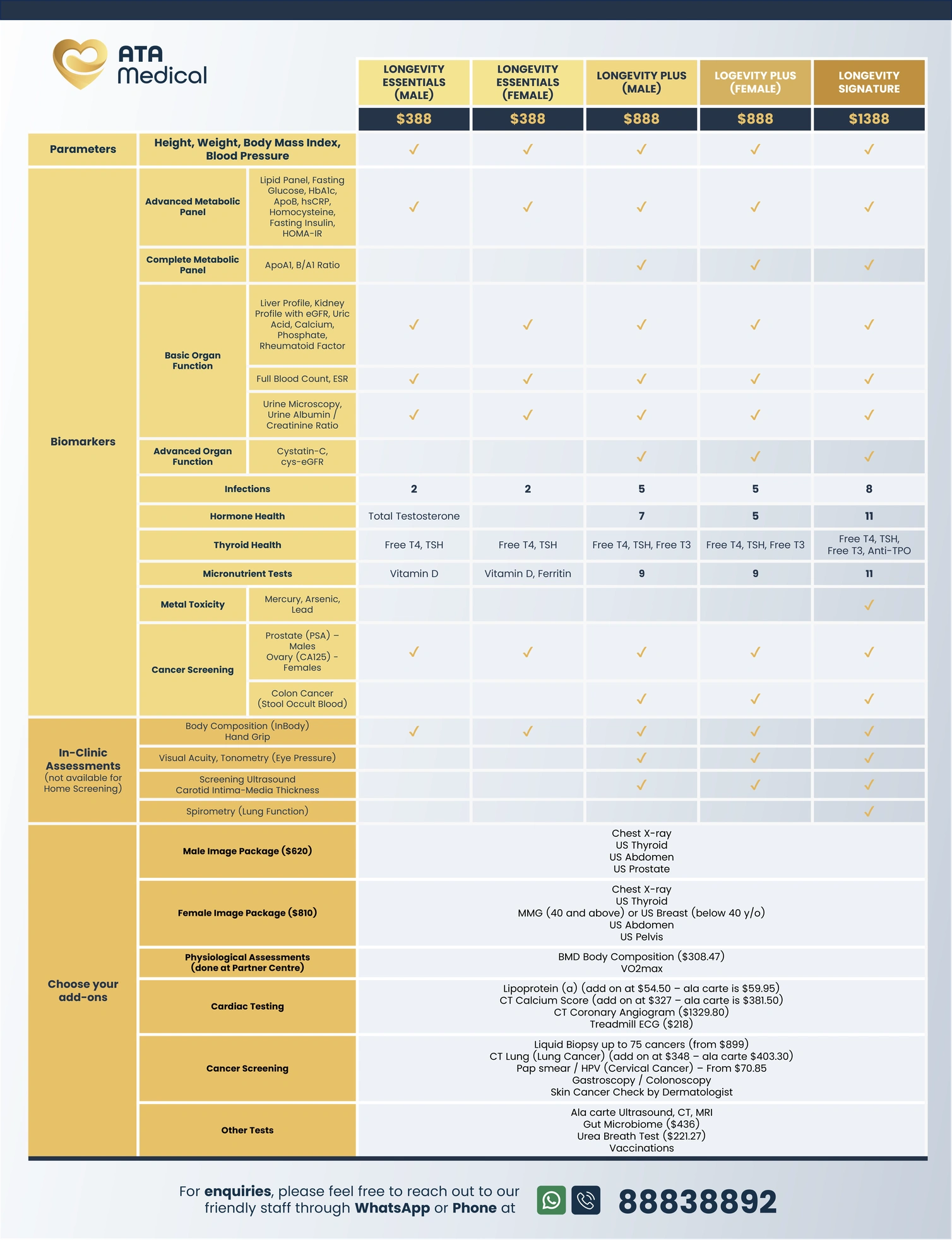
Miscellaneous
We also provide home health screening or blood tests at your location at your convenience. Alternatively, you can consider going for our routine and comprehensive health screening packages. Our Royal ($667*) and Jewel ($1415*), and Marvel ($2289*) package have various blood and ultrasound tests bundled with them.
*Prices are NETT (where applicable) and inclusive of GST.
^Prices last updated on
Jan 28, 2026. While every effort is made to keep pricing information up to date, please contact our team to confirm the latest rates.
How Do I Book a Heart Check Up Appointment in Singapore?
ATA Medical @ Orchard
Nearest MRT: Orchard Boulevard Station (TE13)
Contact Number: 6223 0682
Email: camden@atamed.sg
Opening Hours:
Mon - Fri: 8:30 AM to 12:30 PM, 1:30 PM to 5:30 PM
Sat: 8:30 AM to 12:30 PM
Sun & PH: Closed
ATA Medical @ Tanjong Pagar
Nearest MRT: Tanjong Pagar Station (EW15)
Contact Number: 6223 0682
Email: hi@atamed.sg
Opening Hours:
Mon - Fri: 8:30 AM to 12:30 PM, 1:30 PM to 5:30 PM
Sat: 8:30 AM to 12:30 PM
Sun & PH: Closed
Takeaway
Given the alarming statistics in Singapore, regular cardiac health screenings play a crucial role in preventing heart diseases. These screenings, ranging from simple blood tests to more detailed imaging like CTCA, can help identify early signs of heart disease, allowing for prompt and effective treatment. Please talk to your doctor to determine the most appropriate tests based on your health profile and risk factors, and take a proactive step towards maintaining heart health. For those with abnormal results or more complex cardiac conditions, a consultation with a heart specialist in Singapore may be beneficial for further evaluation and management.


